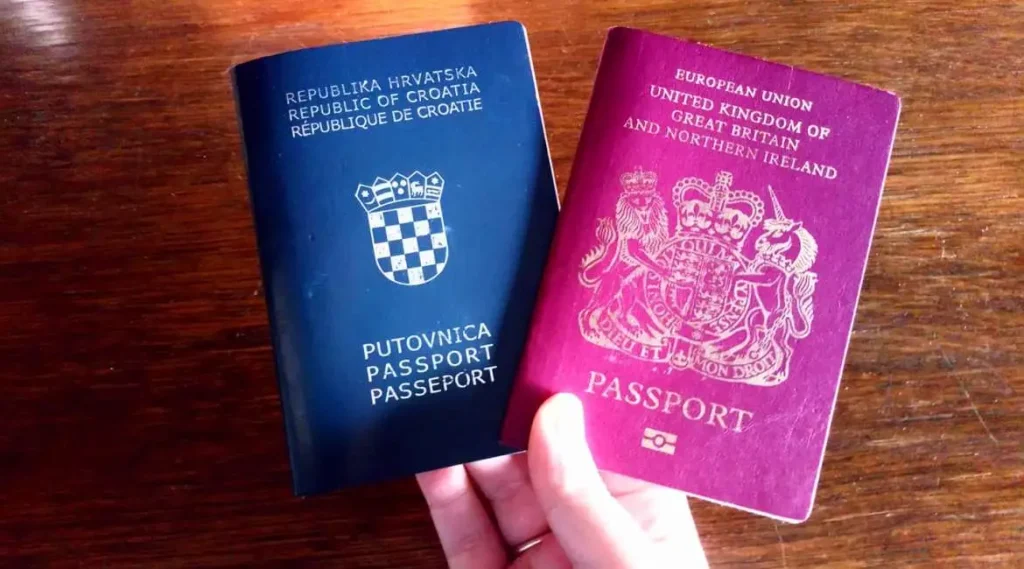When I moved to Croatia in 2002, the new Croatian passport was about a decade old and fairly weak on the international stage. By contrast, the British passport was one of the strongest and most desirable in the world.
How times change…
Brexit has been a real pain in the ass for so many British citizens on so many levels, one of the great own goals of all time, and Brits feel the pain of Brexit on so many levels on everyday life. I was shocked, for example, on my last trip to the UK (the first in several years) that I was no longer free to fill my car up with as much booze as I liked at the Calais Duty Free. But there are many much bigger restrictions now, such as 90-day maximum stays in countries like Croatia, as well as restrictions on things such as buying property for Brits abroad.
A complete own goal. And it is safe to say that the British passport is no longer cool.
One of the biggest beneficiaries of the Brexit debacle in terms of new citizens has been the Republic of Ireland. Similar to Croatia, Ireland has a huge history of emigration, and yet suddenly, it found itself incredibly in demand over the Brexit saga. A population of 5.8 million issued an astonishing number of passports (I read it was 2.4 million over a 3-year period around Brexits), as mostly Brits scrambled for a way to maintain access to the EU and all its perks. With its policy of granting automatic citizenship to people who could prove an Irish grandparent, many took the option – myself included. Will all those people move to Ireland to live? Of course not, but there will be some mutual benefits from these new relationships.
Yesterday’s green light for Croatia to join the Schengen zone in 2023 got me thinking about that weak Croatian passport of 2002 and the new reality today, especially when compared to the British passport. One of the most popular articles ever on TCN was due to the blue Croatian passport at the height of the Brexit debate. One of the tangible benefits of leaving the EU apparently was that the UK would be free to choose the colour of its passport – as though there were not more important things to think about for the future. This was ‘taking back control’ for the masses, rejecting the hated Burgundy EU version. At least until we pointed out that Croatia had decided to remain blue. The article remains popular today.
By contrast, look at the rise of the Croatian passport, and its relevance and its power. And look at it from the viewpoint of those in the Croatian diaspora in the likes of Peru, Argentina and Chile..How much simpler could life be with a Croatian passport?
2013 – Croatia enters the EU – unrestricted access to the entire EU market for business and travel.
2021 – Visa-free travel for Croatian citizens to the United States.
December, 2022 – Double-taxation treaty signed with the United States.
December 2022 – Croatia confirmed into the Schengen Zone from January 1, 2023
January 1, 2023 – Croatia will officially adopt the Euro.
Croatia is also one of the safest countries in the world, with some of the best lifestyle in Europe, as well as brimming with authentic experiences. It now has an A-league passport and access to key markets to add to its portfolio.
There has never been a better time to search for those ancestral documents and start the process towards Croatian citizenship.
Would you choose a British or Croatian passport in 2002? No contest. And while I am more than happy with my Irish passport, the call of the Croatian EU blue in 2022 is stronger than the British one, even though they have ‘taken back control.’
Meet the returnees who are coming back and making a success of life in Croatia in our Croatian Returnees Reflection series.
****
What is it like to live in Croatia? An expat for 20 years, you can follow my series, 20 Ways Croatia Changed Me in 20 Years, starting at the beginning – Business and Dalmatia.
Follow Paul Bradbury on LinkedIn.
Croatia, a Survival Kit for Foreigners is now available on Amazon in paperback and on Kindle.










